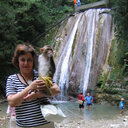[Features of memantine action profile in cholinergic deficit and intracerebral posttraumatic hematoma (hemorrhagic stroke) models in rats].
Keywords
Abstract
Memantine, a low-affinity non-competitive antagonist of glutamatergic NMDA-subtype receptors, was used at a daily dose of 1 mg/kg over 10 days for the treatment of rats with cholinergic deficit induced by the chronic administration of scopolamine (1 mg/kg, 20 days). The drug prevented violation of the learning of conditioned active and passive avoidance reflexes and produced no significant effect on the emotional state of animals in elevated plus maze (EPM) test. In animals with intracerebral posttraumatic hematoma (hemorrhagic stroke), memantine (2 mg/kg, for 3 days after operation) completely prevented the loss of animals, reduced the neurological deficit, improved conditioned passive avoidance reflex performance, and decreased emotional stress in the EPM test.



